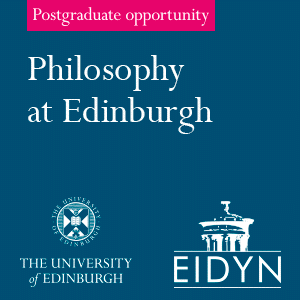Philosophers Among NEH Grant Winners
The National Endowment for the Humanities (NEH) has announced the winners of its latest round of grants.
Among the winners are several philosophy professors. They’re listed below, along with their project titles and descriptions, grant amounts, and grant types:
- Jose Bermudez (Texas A & M University) and Catherine Conybeare (Bryn Mawr College)
Reconsidering the Sources of the Self in the Ancient, Medieval, and Early Modern Periods
A conference and preparation of an edited volume of essays on the influential Sources of the Self: The Making of Modern Identity by philosopher Charles Taylor (1931–).
$48,961 (Collaborative Research) - Richard Cohen (University at Buffalo)
Emmanuel Levinas: Ethics of Democracy
A One-week seminar for 16 college and university faculty on Levinas and democracy.
$63,789 (Seminars for College Teachers) - Angela Coventry (Portland State University) and Elizabeth Radcliffe (College of William and Mary)
David Hume in the Twenty-first Century: Perpetuating the Enlightenment
A four-week institute for 30 college and university faculty on the Scottish thinker David Hume.
$185,975 (Institutes for College and University Teachers) - Karen Detlefsen (University of Pennsylvania) and Lisa Shapiro (Simon Fraser University)
New Narratives in the History of Philosophy: Women and Early Modern European Philosophy
A conference on the works of early modern women philosophers (1500 to 1850) in preparation for an edited volume of essays.
$50,000 (Collaborative Research)
Also funded is an education researcher’s project on philosophers of education:
- Peter Gibbon (Boston University)
What We Teach and Why: Philosophers of Education from the Enlightenment to the Present
A three-week seminar for 16 K-12 educators on the philosophical foundations of American education.
$105,000 (Seminars for School Teachers)
The NEH awarded grants totaling $29 million to 215 projects this round*. That means that only 1.86% of the grants, and 1.2% of the funding, went to philosophy professors.
* Correction: the original version of this post mistakenly attributed these figures to the 2019 year in total, rather than to the latest round of funding. Thanks to Malcolm Keating for the correction.




Why “only” 1.86% and 1.20%? Do we have any reason to think those are “bad” numbers as opposed to “good” numbers?
Right, to put the numbers in context, we’d also need to know what percentage of NEH grant applicants (in this round) were philosophers, and what percentage of the $29M pot was funding requested by philosophers.
The average grant success rate is about 16%, according to the NEH, so already that’s not an encouraging number, esp. compared to other grant programs. Without more details, it’s possible, but very unlikely, that 100% of philosophers who apply are funded, but even that number might not tell us much, if the sampling size is too small.
https://www.neh.gov/grants/application-process
Congratulations to all of the recipients–all of these projects seem wonderful and worth funding.
It might be useful to start a discussion about whether academics should spend their time pursuing funds from organizations like the NEH. I say this because it’s hard for me to see NEH funding as anything other than a professional dollar auction. $29M was awarded, but there’s no doubt that many, many multiples of this number went into writing and evaluating the proposals, and those numbers don’t take into account the massive amounts of money universities spend on administrators in their grants office to help “facilitate” the process of applying for external funding.
It’s also important to keep in mind that a significant percentage of these awards will be syphoned off by the university research offices. For my university, the “federally negotiated” overhead number is 46%. So someone awarded $100k would see roughly $69,000 go to their project, and the other $31,000 syphoned off. (It’s important to note that the NEH website says that a university’s “research” rate will often not be the appropriate one to use because it is meant to apply to projects in the hard sciences and not humanities, but our “teaching” rate is also 46%. If you’ve received an NEH grant, I’d be curious to know what the difference is between the federally negotiated rates provided by your research office and what the NEH allowed you to collect.)
The alternative to the NEH and other governmental entities are private and local donors. Pursuing support from those donors isn’t without its own pitfalls, but they seem to avoid most of the aspects of the NEH competitions that make them look like dollar auctions.
Thoughts from folks who frequently pursue external funding?
Michèle Lamont’s book “How Professors Think: Inside the Curious World of Academic Judgment” studies the sociology of these prizes and how they are awarded.
Notably, she mentions that philosophy projects rarely win because committee members perceive them as insular and of little general interest (contra history, the biggest winner).